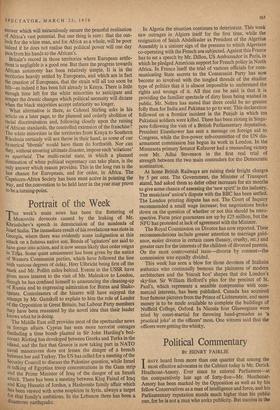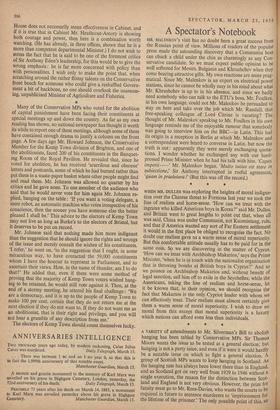Political Commentary
BY HENRY FAIRLIE T HAVE heard from more than one quarter that among the I most effective advocates in the Cabinet today is Mr. Derick Heathcoat-Amory. Ever since he entered Parliament—at the comparatively late age of forty-five—Mr. Heathcoat- Amory has been marked by the Opposition as well as by his fellow Conservatives as a man of intelligence and force, and his Parliamentary reputation stands much higher than his public one, for he is not a man who seeks publicity. But success in the House does not necessarily mean effectiveness in Cabinet, and if it is true that in Cabinet Mr. Heathcoat-Amory is showing both courage and power, then here is a combination worth watching. (He has already, in three offices, shown that he is a more than competent departmental Minister.) I do not wish to stress the fact that he is said to be one of the foremost critics of Sir Anthony Eden's leadership, for this would be to give the wrong emphasis : he is far more concerned with policy than with personalities. I wish only to make the point that, when scratching around the rather flimsy talents on the Conservative front bench for someone who could give a reshuffled Govern- ment a bit of backbone, no one should overlook the unassum- ing, unpublicised Minister of Agriculture and Fisheries.
Many of the Conservative MPs who voted for the abolition of capital punishment have been facing their constituents at special meetings up and down the country. As far as my own reading has shown, no national newspaper has thought it worth its while to report one of these meetings, although some of them have contained enough drama to justify a column on the front page. A few days ago Mr. Howard Johnson, the Conservative Member for the Kemp Town division of Brighton, and one of the abolitionists, faced 200 of his constituents in the Banquet- ing Room of the Royal Pavilion. He revealed that, since he voted for abolition, he has received 'scurrilous and obscene' letters and postcards, some of which he had burned rather than put them in a waste-paper basket where other people might find and read them. Mr. Johnson was allowed no quarter by his critics and he gave none. To one member of the audience who said that he would never vote for him again Mr. Johnson re- plied, banging on the table : 'If you want a voting delegate, a mere robot, an automatic machine who votes irrespective of his conscience, then the sooner you have someone else the better pleased I shall be.' This advice to the electors of Kemp Town may not live as long as Burke's to the electors of Bristol, but it deserves to be put on record.
Mr. Johnson said that nothing made him more indignant than the suggestion that he should ignore the rights and wrongs of the issue and merely consult the wishes of his constituents. 'I refer,' he went on, 'to the suggestion that I ought, in some miraculous way, to have contacted the 59,000 constituents whom I have the honour to represent in Parliament, and to ascertain their views. How, in the name of thunder, am Ito do that?' He added that, even if there were some method of proving that the majority of Kemp Town voters wished hang- ing to be retained, he would still vote against it. Then, at the end of a stormy meeting, he uttered his final challenge: 'We are a democracy, and'it is up to the people of Kemp Town to make 100 per cent. certain that they do not return me at the next election if they do not want to. If they do not want me as an abolitionist, that is their right and privilege, and you will not hear a grumble of any description from me.'
The electors of Kemp Town should count themselves lucky.



































 Previous page
Previous page